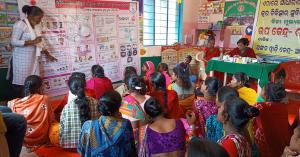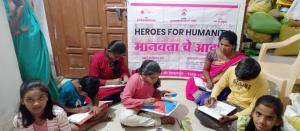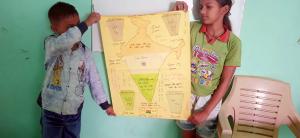The Desai Foundation: Fighting for women and girls in India

Women at Camp Nydhee learn about menstrual health and hygiene in the Heroes for Humanity initiative, April 19, 2022.
The Desai Foundation’s programming empowers women and girls with knowledge and opportunities that increase prosperity and wellness within the entire community.
BOSTON, MA, USA, July 27, 2022 /EINPresswire.com/ -- “Women in India are in a precarious position, teetering with every new challenge that besets them,” says Megha Desai, President of The Desai Foundation, a nonprofit providing social services that empower women and girls in rural India and the U.S. for 25 years.“The U.S. set women back 50 years through legislative decree. In India, they’re set back by circumstance,” she says.
GENDER NORMS. Traditional gender norms [https://www.pewresearch.org/fact-tank/2022/03/15/in-india-and-many-other-countries-there-is-little-gap-between-men-and-women-in-attitudes-on-gender-issues/] and bias in India place women and girls in subordinate status to men and boys, with opportunities for education, employment, and leadership generally offered to men and boys ahead of women and girls.
ACCESS TO EDUCATION. Though education is free and compulsory for children 6-14 years of age in India, girls are less likely to complete school for reasons including cultural gender roles that assign housework, [https://time.com/5614642/india-girls-education/] child-care, and elder-care to girls and women. The National Family Health Survey (NFHS-5) found 64% of girls ages 15-17 in rural India [http://rchiips.org/nfhs/NFHS-5Reports/NFHS-5_INDIA_REPORT.pdf] do not go to school.
MENSTRUAL EQUITY. Menstruation is the second leading reason for girls to miss school. A 2015 Dasra report [https://www.dasra.org/resource/improving-menstrual-health-and-hygiene#:~:text=Dasra's%20report%20Spot%20On!,health%20and%20hygiene%20in%20India.] found 23% of menstruating girls drop out of school due to lack of access to menstrual hygiene products, information, and cultural stigmas which mark them as “unclean” while menstruating. What’s more, the pandemic caused a sanitary napkin shortage. [https://www.bbc.com/news/world-asia-india-52718434]
POVERTY. Impoverished populations face higher rates of infant mortality, malnutrition, disease, child labor, lack of education, and child marriage. Since the pandemic, 75 million have joined the ranks of India’s poor according to Pew research. [https://www.pewresearch.org/fact-tank/2021/03/18/in-the-pandemic-indias-middle-class-shrinks-and-poverty-spreads-while-china-sees-smaller-changes/] Women and girls suffer the most when family incomes drop.
CLIMATE CHANGE AND FOOD INSECURITY. Added to these perpetual struggles is extreme weather activity in India. India is experiencing record-breaking heatwaves, unusually heavy monsoon rains, and farmers are reporting not only fewer crops, but poorer quality crops.[https://www.technoserve.org/blog/indias-record-breaking-heat-wave-is-costly-for-farmers/]
COVID-19. The death toll is estimated between half a million and 4 million, leaving families weakened and in despair. While India’s Ministry of Finance reports as of May 2022, the economy is back to pre-pandemic levels, the repercussions of two years of slow economic activity and job losses, which catapulted unemployment to 23.5% in April 2020 [https://www.hks.harvard.edu/sites/default/files/centers/cid/files/publications/CID_Wiener_
Inequality%20Award%20Research/Policy%20Briefs/Abhishek%20Anand%20(1-A).pdf] will be felt for years to come.
“With so many families and communities broken by COVID-19, the burden of rebuilding will fall on women and, worse, girls,” writes Desai in an op-ed for The Boston Globe.
While the obstacles to achieving higher standards in women’s livelihood seem unending, there are advances happening across India thanks to decades’ worth of laudable activities and programs by the public and private sectors.
“Our collective work is to ensure women and girls’ advancements don’t backslide,” says Desai. “In rural areas, women and girls are the backbone of their families and communities. Their prosperity fuels entire nations. They absolutely need our highest attention and support,” she says.
Desai speaks from personal experience. Her organization aims to solve long-term socio-economic problems and support sustainable, community-driven development. Their decades of grassroots work in India shows that supporting women is the right approach to uplifting the entire community.
IMPACT. To date, The Desai Foundation’s India programming has provided direct services to 3.3 million people in seven states, with an eighth state, Karnataka, joining the service area in July 2022. Together with community and local NGO leaders, they co-create programs communities need. More than 30 programs have been formalized, including health screenings, COVID-19 recovery and relief, menstrual health, vocational training, entrepreneurship programs, creative learning labs, and more.
FLEXIBLE AND SCALABLE. The Desai Foundation programs are flexible and scalable. When the second wave of COVID-19 hit India in 2021, they responded quickly with two programs. The first, MASKS OF HOPE, hired 500 women from the DF sewing program to sew masks in the safety of their homes. Their industry resulted in more than one million masks distributed to the most vulnerable communities.
The second response was HEROES FOR HUMANITY (HFH), a COVID-19 Relief & Recovery initiative with S.P. Hinduja Banque Privée. Their goal was to hire and train 500 individuals (Heroes) to raise public awareness about the coronavirus and vaccinations. They are villagers themselves who visit communities to set the services wheels in motion. Services include food ration kits, delivery of menstrual health information and sanitary pads, support to connect folks with government-sponsored services, health screenings for vision, reproductive health, and general checkups, vocational training, and more.
NEARLY 3 MILLION SERVED IN ONE YEAR. This month, Heroes for Humanity initiative celebrates its first anniversary. In just one year, Heroes like Sayra in Rajasthan, Shivkanya in Maharashtra, Junesh in Odisha, Munira in Gujarat, Nisha in Uttar Pradesh, and hundreds more, brought hope and opportunity to nearly 3 million people in their communities.
“Initially it felt next to impossible to launch the HFH program… But with the support from The Desai Foundation, I feel amazed today. We have successfully transformed hundreds of women, and many were the first-time earners because of the Heroes for Humanity Program,” says Desai Foundation program partner, Sanjay Pandey of Purvanchal Seva Sansthan, Uttar Pradesh.
To celebrate, The Desai Foundation hosted a two-hour livestream [https://www.youtube.com/watch?v=LTtBFakg8x0&ab_channel=DesaiFoundation] YouTube presentation out of their offices in Navsari, Gujarat. Heroes and partners from across the country called in to participate. A film about the program and a one-year impact report can be found on the organization’s website.
“We’re pleased to continue Heroes for Humanity into its second year,” says Karam Hinduja, CEO of S.P. Hinduja Banque Privée. “Programs such as this that provide hands-on solutions to fight the devastation in rural India are needed now more than ever to ensure India’s recovery and the continued advancement of women and girls.”
The Desai Foundation now embarks on year two of the Heroes for Humanity initiative and invites support from likeminded philanthropic organizations, nonprofits, and individuals. Parties wishing to join The Desai Foundation’s mission to empower women and girls in rural India are invited to contact Desai with proposals.
Megha Desai
The Desai Foundation
+1 781-270-3655
megha@thedesaifoundation.org
Visit us on social media:
Facebook
Twitter
LinkedIn
Other
WATCH NOW: Meet a few of the Heroes who've brought hope and services to nearly 3 million villagers in rural India in just one year! at https://vimeo.com/711146707?embedded=true&source=vimeo_logo&owner=175302631


